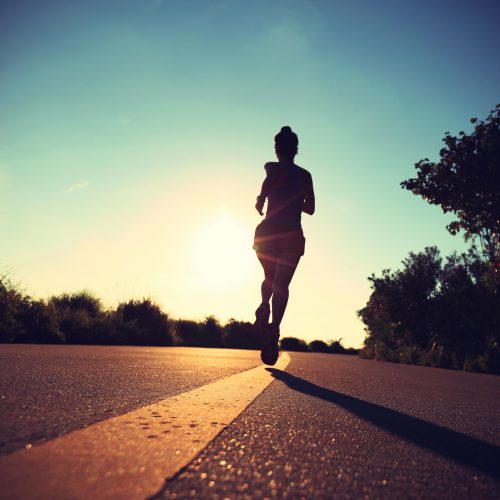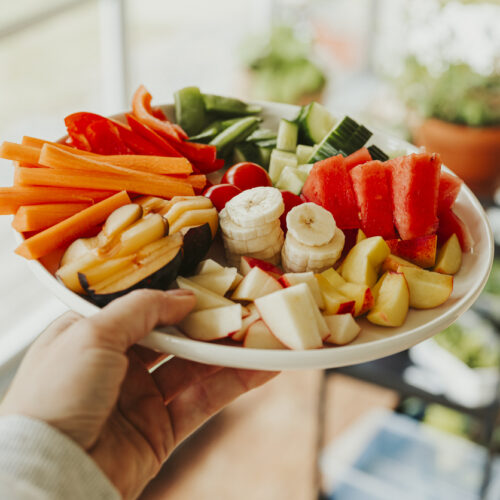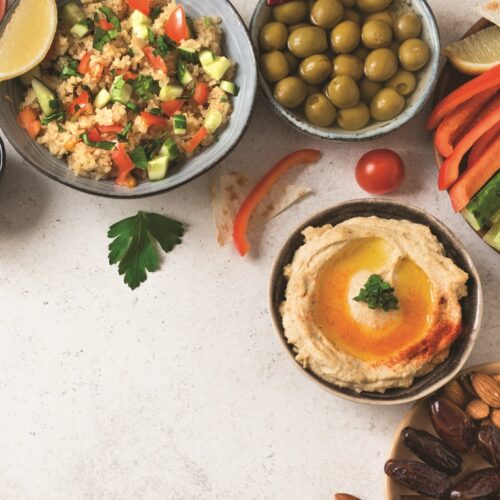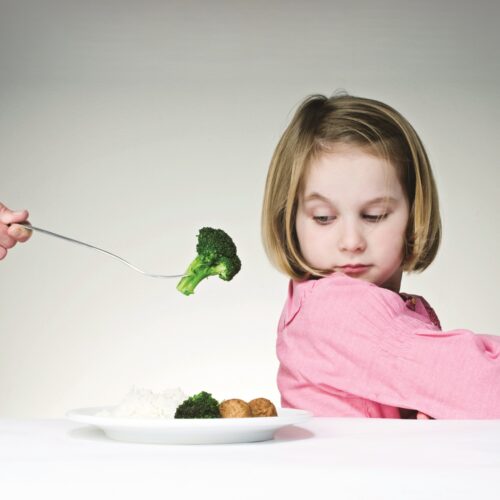
Dietitian Jessica Moulds shares nutrition advice for runners for your best long-distance performance.
Preparation: Get the basics right!
Whether you are preparing for your first marathon or your fiftieth, getting the basics of nutrition right is the first step to success. Subconsciously, our bodies are doing some fabulous things to keep us alive and healthy: our heart is beating, our brain is thinking and our kidneys are filtering our blood. Eating a variety of nutritious, whole foods is the key to supporting these and other wonderful processes. If you don’t get the basics right, it will be hard to get the most out of your day, let alone your training. Here are some of the most important basics to think about every day:
- Eat plenty of different coloured vegetables and fruit
- Choose high-fibre, wholegrain breads and cereals
- Include some low-fat dairy or dairy alternatives
- Include monounsaturated and polyunsaturated fats such as olive oil, nuts, seeds, avocado and fish — particularly oily fish such as salmon and tuna
- Include good sources of protein such as lean meat, seafood, poultry, legumes and eggs
- Drink plenty of fluid, preferably water
- Limit alcohol consumption.
Training for a marathon is extremely demanding on the body depending on what your personal goals are. Once you have the basics right, food for optimising your performance will vary from person to person so it is important to find what works best for you. Many of us think that marathon nutrition involves dramatically increasing carbohydrate intake. This is not necessarily the case. It is important to increase your consumption of vegetables, fruit, protein and fat in proportion to your carbohydrate intake. Yes, carbs — potatoes, rice, bread and pasta — are important for energy supply, but it’s important to remember the value of other nutrients as well: protein (muscle repair and growth), fat (protection of vital organs), iron (oxygen transportation), calcium (strong bones), and vitamins and minerals (boosting immunity/promotion of good health).
Keeping a food and feelings diary during your preparation can help you learn about what makes you feel good during a training run. If you run out of energy during or after a run, you are probably not eating enough or recovering properly. If you are regularly getting sick, run down or constantly fatigued, you may be lacking some important vitamins and minerals. A common problem, particularly among female runners, is a lack of iron. Be sure to include iron- rich foods such as leafy green vegetables, eggs, legumes and lean meat while training. If you are still feeling fatigued, get your iron stores tested. If iron stores are low, you may need supplementation. However, supplementation will only help when a recognised deficiency exists. See a health professional to check.
What to eat while training
Good nutrition habits will make the biggest difference to your performance when race day comes. Organisation and preparation are vital when embarking on your training. Carbohydrate intake needs to reflect your daily training load so, for example, for harder training days, you will need more carbohydrate to replenish glycogen stores. On lighter training days, you will need less. Particularly on lighter training days, choose nutrient-dense carbohydrates such as whole grains, vegetables and fruit. On heavier training days, where fuel requirements are increased, additional carbohydrate-rich foods can be orientated around training to enhance performance during or recovery after the session. For example, consume a sports drink or gel during a long run and a carbohydrate-rich snack soon after finishing.
The countdown
The week before the marathon
Continue eating your normal training diet. There is no need to dramatically change what you are eating. Because you will be tapering (running less) in this final week, your muscles will refuel with the carbohydrate that you would otherwise burn off during training.
The most important thing to remember is to stay hydrated. Check the colour of your urine to see if you have had enough fluid. Aim for a pale yellow colour.
The day before the marathon
Take it easy the day before the race. A good stretch session may be beneficial. Keep your muscles limber without wearing yourself out.
Have plenty of fluids and make carbohydrates around 60 to 70 per cent of the food you eat. You don’t want to introduce any new foods. Stick with the familiar.
Eat small, regular meals based on whole-food carbohydrates (whole grains, fruit and starchy veges) and constantly sip on a water bottle. A large plate of pasta is a good choice for a pre-race meal. There are, however, many other high-carbohydrate foods that can make up this meal, such as a baked potato, kumara or rice. It is important to go with what you know works for you. Everyone is different. Depending on what time you eat dinner and whether or not you will have time to eat a good meal in the morning, you may want to add a high- carbohydrate evening snack the night before, such as some fruit and yoghurt or a small bowl of cereal and milk. It is also in your best interest to avoid alcohol as it can interfere with glycogen metabolism in the liver.
Marathon day!
The aim of pre-run food is to top up muscle glycogen stores. So choose easily digestible carbohydrate low in fat, fibre and protein as these nutrients slow down digestion. The timing of your run will determine what time you need to eat. Ideally, try to eat something two to four hours before the race. Most marathons start bright and early in the morning, however, and getting up at 3am may be unrealistic.
These ideas will provide sufficient energy as long as you have had a carbohydrate-based meal the night before the marathon.
OK to eat three to four hours before the run
- fruit salad with fruit-flavoured yoghurt
- crumpets with jam or honey + flavoured milk
- baked potato + cottage cheese filling + glass of milk
- baked beans/eggs on toast
- breakfast cereal with milk
- bread roll with cheese/meat filling + banana
- pasta or rice with a sauce based on low-fat ingredients (eg. tomatoes, vegetables, lean meat)
OK to eat one to two hours before the run
- liquid meal supplement
- milk shake or fruit smoothie
- breakfast cereal with milk
- sports bars (check labels — aim for 40-50g carbohydrate and 5-10g protein)
- cereal bars
- fruit-flavoured yoghurt
- fruit
OK to eat less than one hour before the run
- banana
- sports drink
- carbohydrate gel
- cordial
- sports bars
- jelly lollies
During the marathon
Easily digestible carbohydrate may be beneficial depending on the adequacy of the pre-race meal and other factors (such as environmental conditions). Sports bars, sports drinks (serving a dual supply of carbohydrate and fluid), energy gels, gummy lollies and bananas are all popular among athletes. One gel per hour of exercise or half a bottled sports drink is a basic guideline. It may come down to what is convenient for you, ie. the ease of carrying energy gels over bananas. Practise fuel and fluid strategies during hard training sessions to assess your tolerance before race day.
After the race
Eating for recovery
Make sure you rehydrate. Water is best but a sports drink with electrolytes and carbohydrate may be beneficial. As running uses up glycogen stores and breaks down muscle tissue you need to replenish these with protein and carbohydrate as quickly as possible (ideally within 30 minutes of finishing). Make this a habit after every training run and if doing more than one training session per day. Easy options include a bowl of cereal and milk, liquid meal supplement, a can of creamed rice or a banana and two boiled eggs. Even if you don’t feel like eating, it’s important to have something: a sports drink or flavoured milk are also good options.
Marathon training FAQs
Do I need extra protein or extra carbs?
Carbohydrates and protein are an important part of your training diet. However, more is not necessarily better. Too much of even the right kinds of food may impair performance through weight gain. Studies show that excessive protein is not required and provides no additional benefit to muscle repair or increasing muscle size. Having more than two grams per kilo per day has no advantage in strength gains or recovery.
Do I need sports drinks?
Many studies show that for intense exercise lasting more than an hour, runners perform significantly better when drinking a sports drink than when drinking plain water. However, if running shorter distances and trying to lose weight, sports drinks may provide extra, unwanted kilojoules and water should be sufficient provided you have eaten well beforehand.
Are there any foods or supplements that might give me an edge or extra endurance?
Supplements such as protein shakes and sports drinks can be convenient fuel especially if training multiple times per day. Real food, however, comes first. Supplements only need to be used to supplement the diet if your food intake is inadequate.
Caffeine can be an effective performance enhancer. No-Doz or coffee are commonly used by athletes before endurance races. Around 3mg per kilo of body weight an hour before the race has been shown to improve performance. But more is not better and everyone has a different tolerance. It is important to figure out if caffeine is a good option for you. You do not want to become reliant on caffeine as it reduces sleep quality, so can be detrimental to performance if using regularly.
What should I avoid during my training?
- Alcohol: Avoid binge drinking as this can be detrimental to your training and affect glycogen metabolism in the liver.
- Overtraining: Make sure you have a rest day every week; your muscles need time to recover.
- Overcompensating: Avoid rewarding yourself with food after a training session. Recover with good quality food and save treats for times you will really enjoy them.
- Limit processed food and load up on nutritious whole foods.
www.healthyfood.com










